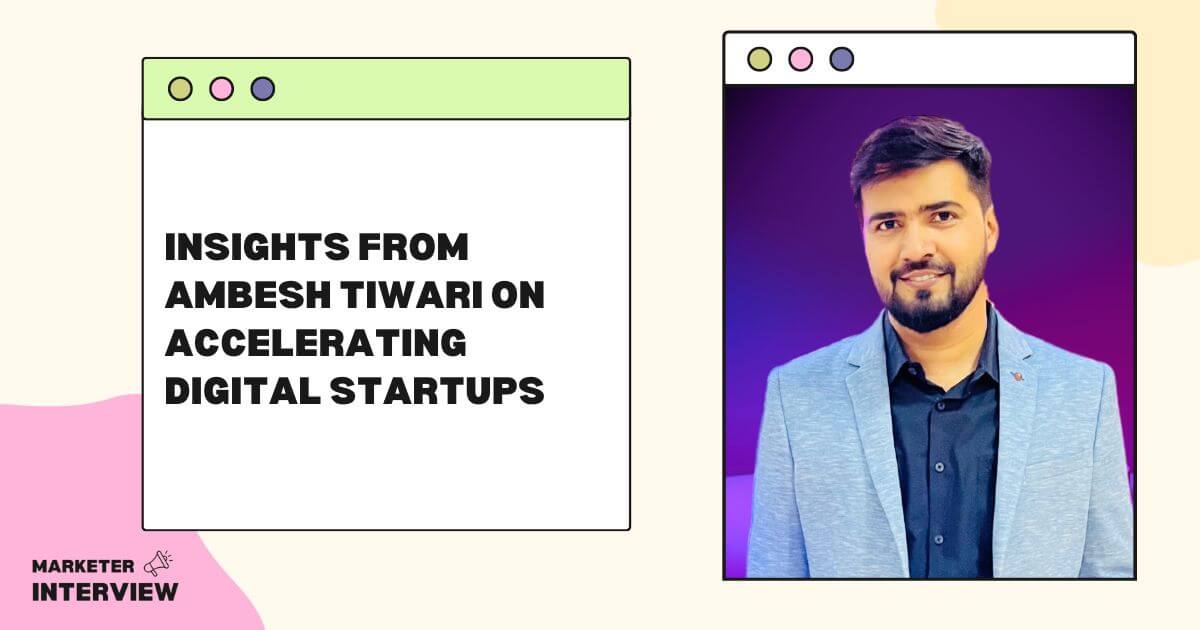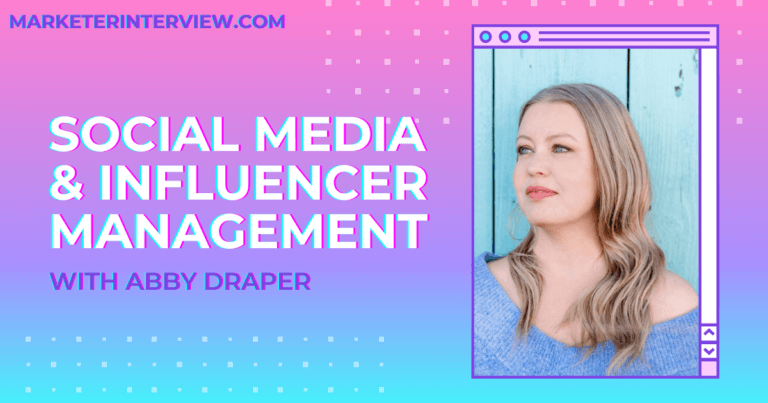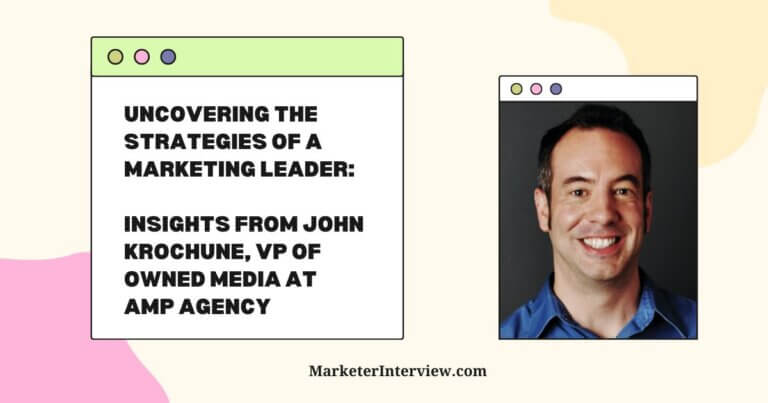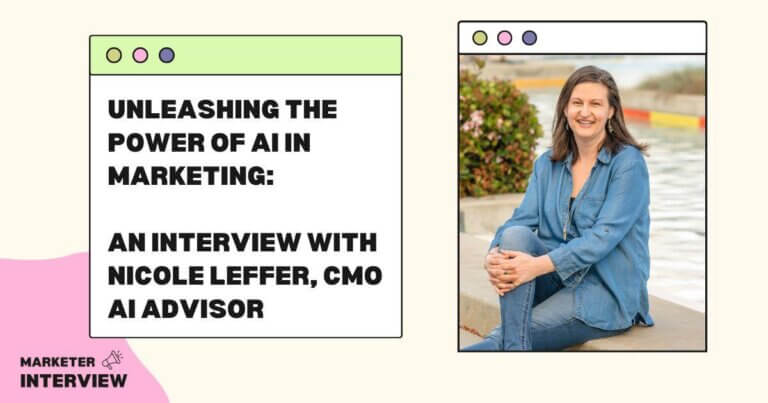Insights from Ambesh Tiwari on Accelerating Digital Startups
Welcome to Marketer Interview! In this edition, we have the pleasure of speaking with Ambesh Tiwari, the Founder of BDA Technologies.
With his extensive experience in business development, marketing, and technology, Ambesh has helped numerous professionals and entrepreneurs achieve growth and success in the digital realm.
Join us as we delve into Ambesh’s journey, milestones, and expertise to discover valuable insights on starting and accelerating digital startups.
Contents
- 1 Can you tell us about your journey and how you found your passion for marketing and technology?
- 2 With a background in engineering and a postgraduate degree in marketing, how have these two disciplines influenced your approach to business development?
- 3 Could you share some highlights of your career, such as the social media strategies that led a Femina Miss India contestant to the top 6 or the digital campaigns for CA & CS elections?
- 4 What motivated you to found BDA Technologies, and how has it evolved?
- 5 As an expert in personalized marketing and sales strategies, what advice would you give to professionals and entrepreneurs looking to thrive in the digital landscape?
- 6 What are some common challenges that online marketers face, and how can they overcome them?
- 7 What strategies do you recommend for nurturing and maintaining strong connections with clients?
- 8 Word-of-mouth publicity can significantly impact a startup’s growth. What tactics have you found effective in generating positive word-of-mouth for businesses?
- 9 Can you share an example of a tech solution you built that successfully helped a professional or entrepreneur scale their business? How did it make a difference?
- 10 In today’s fast-paced digital world, what tools and software do you rely on for your work, and how do they contribute to your success?
Can you tell us about your journey and how you found your passion for marketing and technology?
My journey into marketing and technology started quite early. I was always fascinated by how technology could shape our lives, and this interest was further nurtured during my education.
I graduated in Engineering after obtaining my B. Tech degree, my interest in the business side of technology led me to pursue post-graduation in Marketing.
One thing that has consistently driven me throughout my career is the desire to leverage technology to solve challenges and create value for businesses.
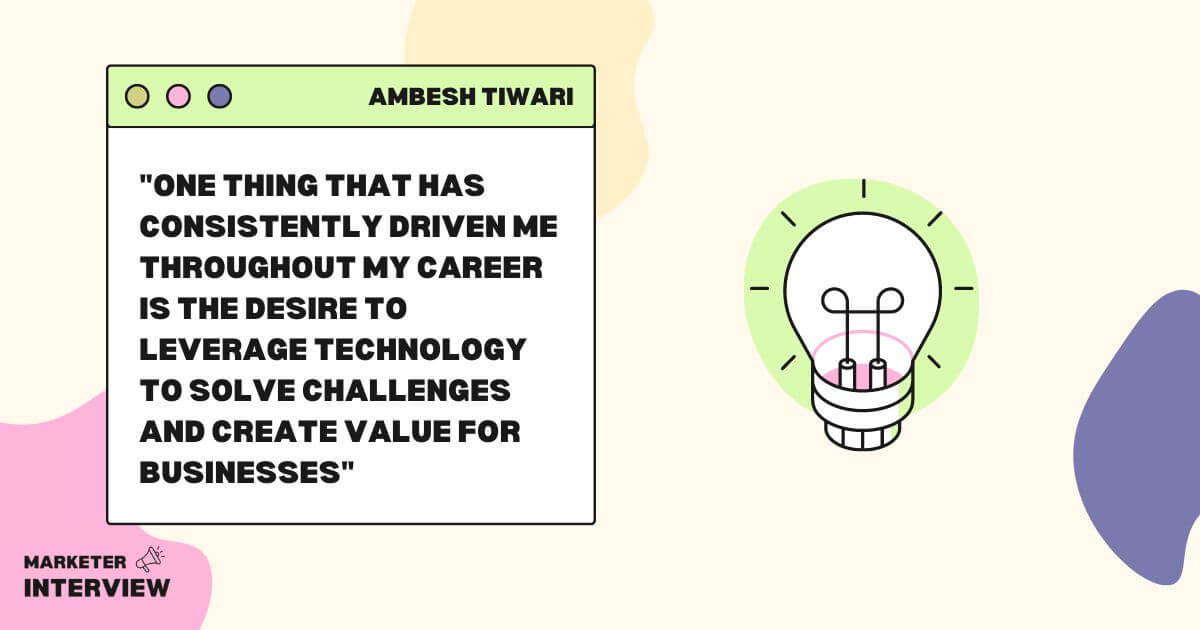
With a background in engineering and a postgraduate degree in marketing, how have these two disciplines influenced your approach to business development?
My educational background in both engineering and marketing has deeply influenced my approach to business development.
These two disciplines, although different, complement each other incredibly well in the modern business landscape, especially in a technology-driven world.
Engineering, at its core, is about solving problems. It teaches you to look at systems, identify inefficiencies or gaps, and design and implement solutions.
On the other hand, my postgraduate degree in marketing has given me insights into the consumer side of the equation.
So, my engineering background allows me to understand and utilize the “tools” (technology and data). At the same time, my marketing degree helps me understand the “why” and “how” of using these tools to meet customer needs and drive business growth.
This blend of technical and business insights enables me to bridge the gap between technology and business, making me better equipped to drive business development in the digital age.
I’d love to share some insights on the strategies that led to those successful campaigns.
The key to the Femina Miss India campaign was understanding the contest and the image we needed to project to resonate with them.
The first step was a thorough analysis of the competition and a deep dive into our contestant’s strengths and weaknesses. This gave us a clear understanding of the positioning we needed to adopt to differentiate our contestant from the rest.
Next, we leveraged social media platforms to build the image we wanted. The audience engagement and support we garnered through our social media strategy were instrumental in this achievement.
The strategies for the CA & CS elections were quite similar. Again, it was about understanding the audience and the candidates and then using that understanding to craft a compelling image and message.
We used social media to position our candidates as knowledgeable, trustworthy, and dedicated professionals with the skills and vision to drive positive change. We highlighted their qualifications, plans for the future, and commitment to their profession.
We used data analytics to optimize our strategies, adjusting our messaging, targeting, and posting times based on the performance data. This data-driven approach with continuous on-ground feedback allowed us to improve our campaign and maximize our reach and impact continually.
Strategic thinking, audience understanding, and data-driven decision-making led to our success in both cases.
What motivated you to found BDA Technologies, and how has it evolved?
My motivation to found BDA Technologies stemmed from recognizing a significant gap in the market.
I noticed that small business owners, who are excellent in their respective fields, often need a strong technology & marketing strategy.
I used my engineering mindset to understand the tools and technicalities involved and my marketing experience to understand the market and the psychologies of the audience.
This dual background allowed me to create effective go-to-market strategies and build solutions that help entrepreneurs & professionals build systems to grow their businesses.
Over the years, BDA Technologies has been recognized by StartupIndia, Govt of India. We use the latest technology to help our client’s businesses grow and improve their customers’ experiences. We’ve been doing this for 6 years and have delivered great digital products and services.
As an expert in personalized marketing and sales strategies, what advice would you give to professionals and entrepreneurs looking to thrive in the digital landscape?
I don’t see myself as an expert. I believe marketing & technology is ever evolving, so I keep learning about them. But as you are asking, here are some critical pieces of advice.
1. Understand Your Audience: Use data analytics to gain insights into your target audience’s needs, preferences, and behaviors.
2. Personalize Your Approach: Engage customers with personalized marketing strategies and dynamic content.
3. Invest time/money in personal branding: Create high-quality content that provides value to your audience.
4. Leverage Social Media: Use social media to engage with your customers and promote your content.
5. Use Technology: Utilize tools and platforms to streamline your marketing efforts and improve your strategies.
6. Never Stop Learning: Stay updated with the latest trends and technologies, and be willing to adapt your strategies.
Always remember success in the digital landscape doesn’t happen overnight.
It requires consistent effort, testing, and refining of strategies. So be patient, stay focused, and keep striving towards your goals.
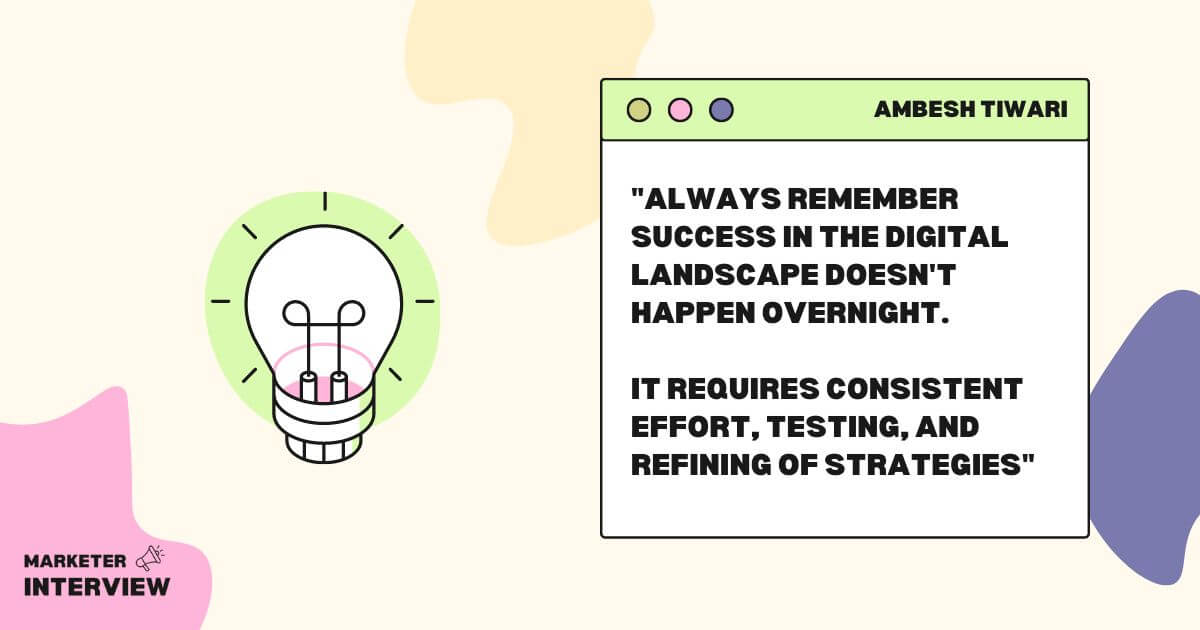
What are some common challenges that online marketers face, and how can they overcome them?
Online marketers today face several challenges. Here are some common ones I felt in my early stages.
1. Consistency: Delivering quality content and regularly posting can be challenging.
It’s essential to create a content calendar and stick to it. Automated scheduling tools can help manage and maintain this consistency.
2. Long-term Growth: Marketers often need help focusing on long-term growth versus short-term gains. It’s crucial to strike a balance.
While short-term wins can boost morale and show progress, a vision for long-term growth ensures sustainability. Regularly revisiting and adjusting your marketing strategy can help keep this balance.
3. Personalization: Consumers expect personalized experiences, but delivering this at scale can take much work.
Utilizing data analytics and CRM tools can help create targeted, personalized content. AI and machine learning technologies can also assist in personalizing at scale.
4. Shiny Object Syndrome: This refers to the temptation to jump on every new trend or tool without considering whether it aligns with your strategy or audience.
It’s essential to stay informed about new trends and evaluate them critically before adoption. Always consider whether a new trend or tool aligns with your overall marketing strategy and the needs of your target audience.
5. Data Overload: With so many data sources available, it can be overwhelming to know what to focus on.
Establishing clear objectives and KPIs can help narrow down the most relevant data to your goals. Utilizing data visualization, tools can also make interpreting and understanding your data easier.
To overcome challenges, plan strategically, use the right tools, and stay focused on long-term goals while being flexible to adapt to new trends and technologies.
What strategies do you recommend for nurturing and maintaining strong connections with clients?
Here are some strategies I recommend which helped me to retain my customers for life:
Regular Communication: Keep your clients in the loop about updates, changes, or relevant information. This can be done through emails, newsletters, or regular meetings.
Personalization: Take the time to understand each client’s unique needs and preferences. This will show them that you value them as individuals, not just as a source of revenue.
Provide Value: Always strive to provide value beyond what’s expected. This could be in the form of insights, advice, or additional services.
Be Responsive: Respond promptly to client inquiries or concerns. This shows that you are attentive to their needs and are willing to assist them.
Seek Feedback: Regularly ask for feedback and consider it. This helps improve your services and shows clients that their opinions matter.
Build Trust: Be transparent and honest in your dealings. Trust is the foundation of any strong relationship.
Celebrate Successes: Celebrate your clients’ successes, big or small. This can build a positive relationship and show you’re invested in their success.
Remember, relationships are built over time. Be consistent in your service delivery, communication, and value proposition. Be patient, genuine, and empathetic in your interactions with clients.
Word-of-mouth publicity can significantly impact a startup’s growth. What tactics have you found effective in generating positive word-of-mouth for businesses?
“Best marketing is marketing with no money.” Word-of-mouth publicity is indeed a powerful tool for businesses, especially for startups.
Here are some tactics that I’ve found effective in generating positive word-of-mouth:
Deliver Exceptional Customer Service: This is the foundation of positive word-of-mouth. Customers with great experience with your company naturally want to tell others about it.
Build Strong Relationships: Take the time to build genuine relationships with your customers. Personalized interactions and making customers feel valued can turn them into advocates for your business.
Create a Unique Experience: If your product or service has a unique aspect or provides a memorable experience, customers are more likely to talk about it.
Ask for Testimonials: Encourage satisfied customers to leave reviews or provide testimonials you can feature on your website and social media channels.
Word-of-mouth is earned through consistently providing high-quality customer experiences, so focus on delivering value and maintaining positive customer relationships.
We specialize in creating custom software solutions tailored to the specific needs of professionals and entrepreneurs.
Our expertise lies in optimizing processes and building Management Information System (MIS) type solutions to boost productivity and accelerate business growth.
We started StartupAccel, a platform to mentor and coach business owners to leverage the latest technologies & strategies to accelerate their startups.
In today’s fast-paced digital world, what tools and software do you rely on for your work, and how do they contribute to your success?
I use different tools and software to make work easier in marketing and technology. This helps me manage projects, analyze data, and stay connected with my team and clients. Here are some of the key ones which I use:
CRM Software: Tools like Flowlu, Clientjoy, or HubSpot are essential for managing relationships and interactions with customers and potential customers.
They provide a centralized platform for tracking leads, managing sales pipelines, and delivering targeted marketing campaigns.
Project Management Tools: Software like Flowlu, Trello, or Jira help me to organize tasks, track project progress, and manage team collaboration. They are critical for ensuring projects stay on schedule and within budget.
Social Media Management Tools: Platforms like Publer or Buffer allow scheduling posts, monitoring social media channels, and analyzing engagement. These tools are essential for managing our presence across multiple social media platforms.
Email Marketing Software: Tools like ConvertKit, Encharge, or SendinBlue help in creating and managing email campaigns, segmenting audiences, and analyzing engagement metrics.
Communication Tools: Slack, Zoom, Whatsapp, and Microsoft Teams are invaluable for staying connected with my team, especially in a remote work environment.
Design Tools: Adobe, Canva, and Figma are used for creating visuals for social media posts, websites, and other marketing materials.
Each tool contributes to success by enhancing productivity, facilitating collaboration, providing valuable insights, and enabling us to engage with our audience more effectively.
It’s important to remember that the tools themselves are just that – tools. The magic happens when used strategically and effectively to meet business goals.
